The Globalized Writer: How Technologies Like Wattpad Create Global Audiences for Student Writers
Published in:
November 21–22, 2014
University of Puerto Rico, Río Piedras
San Juan, Puerto Rico
Creativity and Community
As a teacher of creative writing, I study the effect of the educational environment on student writers, looking to make my university and our creative writing program a place where young creative writers can thrive. Frank X. Barron, one of the pioneers in the psychology of creativity, argued that “the personal sensitivity and understanding available in a supportive educational environment toward a person who is artistically inclined can have a significant effect on a person developing his or her artistic potential in life” (qtd. in Benjamin 2008, 65). Our goal, as teachers of creative writing, has to be to find the most effective ways to make students feel strongly supported and able to construct their own identities as creative writers.
Unfortunately, the cultural clichés assigned to creative artists and writers often portray them as flamboyantly driven by their gifts to the brink of madness or addiction, ignoring the multitude of artistic people who consistently practice their craft. Creativity theorist Elliot Benjamin has developed what he calls the Artistic Theory of Psychology. Benjamin challenges the traditional link between creativity and “mental disturbance” (i.e. the tortured artist as social outcast). Instead, Benjamin defines “the successful creative artist to be a person who has received respect and acknowledgement for his or her work from a community of his or her peers or society at large and also who is considered both psychologically and ethically to be a “well-adjusted” member of his or her society and the greater world” (2008, 64). Benjamin’s argument that peer recognition and community are the key to artistic success and well-being aligns well with the way creative writing is taught in most university writing programs: the workshop method. In the workshop method, student writers bring their assigned writing to class and get feedback from not just their professors, but from other student writers who are at more or less the same skill level as they are—their peers. The professor, rather than handing down assessments of the success of any given piece of writing, is more of a facilitator of a peer-level discussion of its merits and problems. If the professor is a skilled community-builder, the workshop setting is a place where student writers can get the respect and acknowledgement and build the skill of producing work that are needed for a successful creative life.
Benjamin believes this self-motivated artistic connection with the world is the foundation for the “successful creative artist’s” satisfactory adjustment to day-to-day life. The workshop method, I would argue, is a model for this kind of self-motivated connection in a university setting. Benjamin took his theory into the real world by exploring the effect of a creative artist support group on the mental well-being of its participants. In his article “The Creative Artist Support Group: A Case Study” in the Journal of Public Mental Health, Benjamin describes the significant therapeutic benefits he found for members of a community-based creative artist support group, arguing that the social value of peer support allowed the participating artists to develop “natural” (i.e. self-motivated) creative expression in comparison to “normal” (i.e. “socially approved”) patterns of behavior (142).
Finding a Global Community
Benjamin’s findings raise the possibility that evolving technologies that create online community could give all writers the kind of benefits that some writers find in support groups and that student writers find in college workshops. Moreover, it’s possible that these benefits could be found in a community with a global scale. One evolving technology that could serve as a global writing support group is Wattpad, which bills itself as the world’s largest community of readers and writers. The Wattpad website claims “Wattpad is a place to discover and share stories: a social platform that connects people through words. It is a community that spans borders, interests, languages. With Wattpad, anyone can read or write on any device: phone, tablet, or computer” (emphasis mine). Currently on Wattpad, there are 75 million stories to read and 35 million users or “Wattpadders,” who spend 9 billion minutes on Wattpad each month. According to the Wattpad website, what they are providing is “Storytelling Redefined. “They claim to be “redrawing the lines between reader and writer” because:
- Thousands of stories are added each day.
- Wattpad stories are free and always available on any device.
- Anyone can publish their work on Wattpad: students, new authors or established literary stars.
- Readers and writers interact: readers can message the writer and interact with other readers. Writers can talk to their fans.
- Readers can be notified the moment their favorite writer shares a new chapter or poem.
Conceivably, Wattpad could be the largest creative writers support group in the world (but without the coffee and donuts). David Streitfeld alludes to this supportive function in his New York Times article “Web Fiction, Serialized and Social.” Streitfeld notes:
The Internet long ago revamped publishing and bookselling. Now technology is transforming the writing of fiction, previously the most solitary and exacting of arts, into something nearly the opposite. It is social, informal and intimate, with the results not only consumed but often composed on the fly . . . Wattpad eliminates any remaining distance between creator and consumer. The reader has been elevated to somewhere between the writer’s best friend and his ideal editor, one who offers only adoration.
What creative writer does not like adoration?
Student Writers as Self-Publishers
With Wattpad, student writers can create and publish instantly just by typing into the screen:
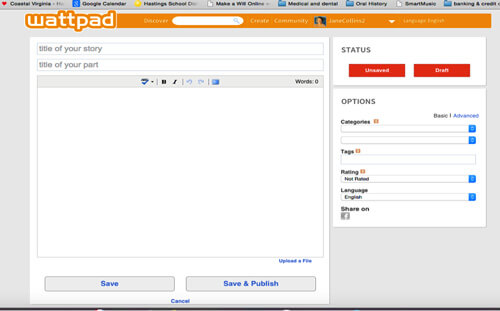
To assess the possibilities of Wattpad as a supportive environment for students of creative writing, I asked for volunteers from my Fall 2014 Introduction to Writing Poetry class. Four students in the class opted to create Wattpad “books” of poetry and to serially publish their poetry over the course of the semester.
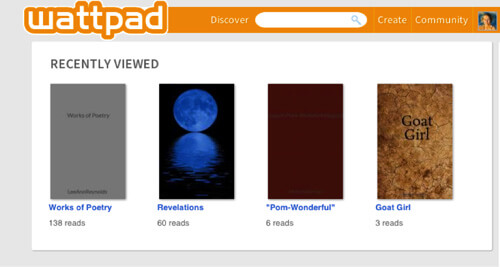
Their results varied by the amount of effort they put into gaining a readership. Below you can see a screenshot of the Wattpad page of the student most successful in gaining a readership: LeeAnn Reynolds. She gained 138 readers in 2 weeks, with 5 votes of popularity and 13 comments. She continues to build her “followers”: people who are alerted whenever she posts new work.
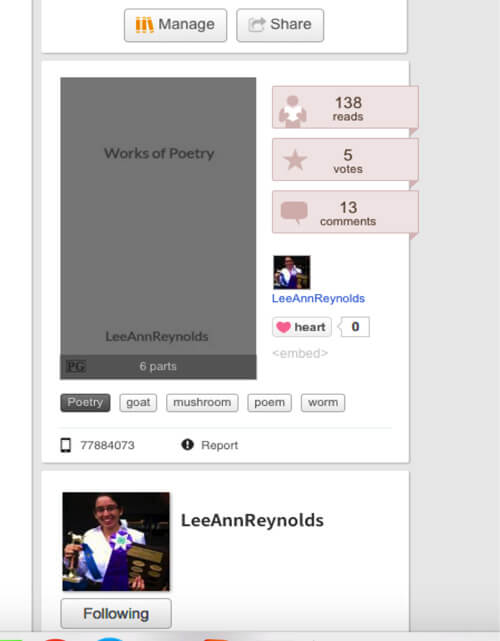
Here is a screenshot of some of the feedback she has gotten from readers:
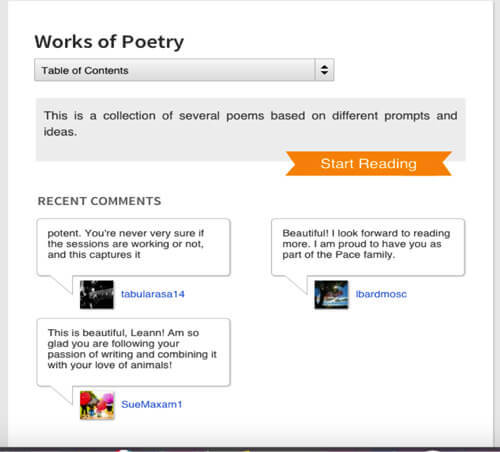
With 89 readers and 6 comments (to which the student poet has replied), this single poem has gotten far more readers than it could have in a college poetry workshop.
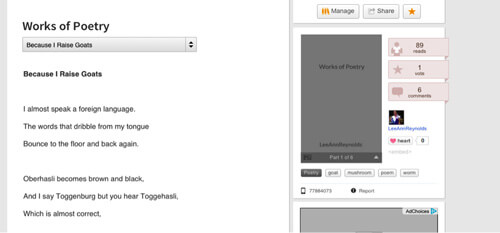
Wattpad offers the student writer a unique blend of a workshop community and a self-publishing opportunity. In their 2013 article “What Satisfactions Do Self-Publishing Authors Gain from the Process?” Alison Baverstock and Jackie Steinitz identify five key types of satisfaction:
- The feeling of being in control.
- A strong feeling of satisfaction with the product created.
- The creation of a support team.
- A feeling of being part of the Zeitgeist.
- A feeling of permanence and discoverability.
Using their criteria as a benchmark, I surveyed LeeAnn about her Wattpad experience. Here are her comments organized by Baverstock and Steinitz’s five categories:
1. Feeling of being in control
LeeAnn: I’ve heard that some authors have gotten their work published because of Wattpad. I think that would be really exceptional to have happen. I’m not sure whether or not it will happen, but having a readership and getting feedback will definitely improve my writing and help me to get published eventually.
2. Feeling of satisfaction with product
LeeAnn: So far, based off of the comments I have received, I can see that I’m heading in the right direction with my poetry, and I also get useful feedback on how to improve.
3. Creation of a support team
LeeAnn: One of my hopes was to gain a loyal following, and although I haven’t built up a huge following yet, my work has already been looked over by several English professors as well as the dean of students. It’s very exciting. I do feel more successful as a writer due to using Wattpad. After I posted some poems, the chair of the English Department and the Dean of Students both told me how much they liked my poetry. The fact that I can self publish in a community of writers allows me to get feedback from fellow writers, which is a very useful tool.
4. Feeling part of the Zietgeist
LeeAnn: I would like to continue posting poetry on Wattpad, but I’d also like to try and self-publish a novel on Wattpad. I think that having a following who are expecting the next chapter of my book will help motivate me to continue working on it. And when I do get books published, if I already have a following, I can advertise my published work to them.
5. Feeling of permanence and discoverability
And, I would like to add a sixth kind of satisfaction to Baverstock and Steinitz’s list of categories:
6. Feeling of global community!
LeeAnn: Wattpad does seem like a community. I’m able to share links to my work on Facebook and my family and friends can see them, whereas otherwise I would have to send it to them individually. Furthermore, the fact that people from around the world can view my work on Wattpad will allow me to get a greater variety of opinions on my work. Being part of a community influences the way I see myself as a writer because, as a writer, I naturally have doubts about my own work.
Self-Publishing, Democracy and Beyond
Some established writers have found the benefits of this global community. The prize-winning Canadian author Margaret Atwood felt she had to defend her use of Wattpad to publish some of her work. In a 2012 article titled “Why Wattpad Works” in the British newspaper the Guardian she parodies the concerns of her critics:
“But Margaret,” you can hear them whispering. “You’re a literary icon at the height of your powers; it says so on your book covers. Why are you sneaking out with an online story-sharing site heavy on romance, vampires and werewolves? You should be endorsing Literature, capital L. Get back up on that pedestal! Strike a serious pose! Turn to stone!”
In the same article, Atwood argues that publishing on Wattpad offers her liberation: “Maybe my dates with Wattpad are a bit undignified. But at my age you can afford to be undignified. You’re free to explore, and to guinea-pig yourself, and to stretch the boundaries.”
Atwood’s Wattpad page has 80,000 followers:
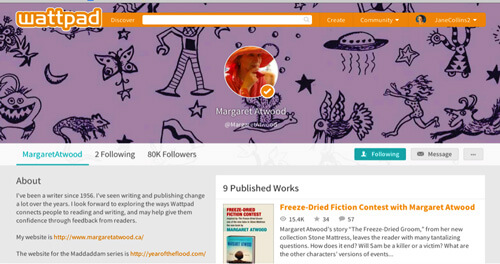
On her Wattpad page, Atwood notes, “I’ve been a writer since 1956. I’ve seen writing and publishing change a lot over the years. I look forward to exploring the ways Wattpad connects people to reading and writing, and may help give them confidence through feedback from readers.”
More than just a phenomenon for interacting with readers, Atwood believes that Internet reading leads to increased literacy that thereby increases democracy. In her Guardian article, she argues:
I got into trouble a while ago for saying that I thought the internet led to increased literacy—people scolded me about the shocking grammar to be found online—but I was talking about fundamentals: quite simply, you can’t use the net unless you can read. Reading and writing, like everything else, improve with practice. And, of course, if there are no young readers and writers, there will shortly be no older ones. Literacy will be dead, and democracy—which many believe goes hand in hand with it—will be dead as well.
Finally, there’s already evidence that Wattpad offers a truly global audience for writers and opportunities for increased global literacy. Allen Lau, the co-founder of Wattpad, remembers getting a letter from an old man in a village in Africa. The village had no school, no library, no landline, and no books. But it had a mobile phone, and on that they could read and share the Wattpad stories. He was writing to say thank you.
References
Atwood, Margaret. 2012. “Why Wattpad Works.” Guardian, July 6.
——. “MargaretAtwood.” Wattpadd. www.wattpad.com/user/MargaretAtwood
Baverstock, Alison, and Jackie Steinitz. “What Satisfactions Do Self-publishing Authors Gain from Process?” Learned Publishing 26(4): 272-82.
Benjamin, Elliot. 2008. “Art and Mental Disturbance.” Journal of Humanistic Psychology 48(1): 61-88.
Benjamin, Elliot. 2014. “The Creative Artist Support Group: A Case Study.” Journal of Public Mental Health 13(3): 142-45.
Streitfeld, David. 2014. “Web Fiction, Serialized and Social.” New York Times, March 23. Accessed November 11. www.nytimes.com/2014/03/24/technology/web-fiction-serialized-and-social.html?_r=0
Wattpadd. “About.” Accessed 2014. www.wattpad.com
Spring 2015: The Global Imperative for Higher Education
